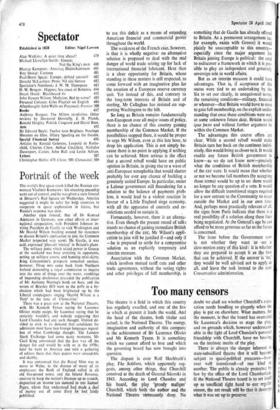Too many censors
The theatre is a field in which this country has regularly excelled, and one of the few in which at present it leads the world. And the head of the theatre, both titular and actual, is the National Theatre. The energy, imagination and authority of this company is the achievement of Sir Laurence Olivier and Mr Kenneth Tynan. It is something which we cannot afford to lose and which the governing board has now brought into question.
The dispute is over Rolf Hochhuth's play, The Soldiers, which apparently sug- gests, among other things, that Churchill connived at the death of General Sikorski in 1943. According to Lord Cliandos and his board, the play 'grossly maligns' Churchill, which both the author and the National Theatre tirenuously deny. No doubt we shall see whether Churchill's repu- tation needs handling so gingerly when the play is put on elsewhere. What matters, for the moment, is that the board has overruled Sir Laurence's decision to stage the play, and on grounds which, however understand- able in the light of Lord Chandos's personal friendship with Churchill, have no bearing on the intrinsic merits of the play.
There is always the danger inherent it state-subsidised theatre that it will become subject to quasi-political pressures—how- ever well intentioned—of one kind Or another. The public is already protected by law by the office of the Lord CbamberlaiP- If the National Theatre board is to set itself up as unofficial right hand to our regular censor, the net result will be that it destroYs What it was set up to preserve.






































 Previous page
Previous page